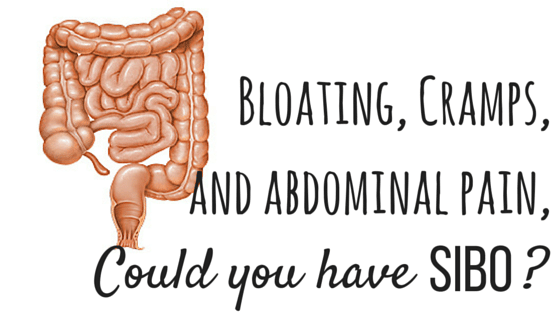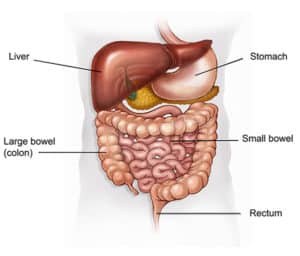
24 Jun Bloating, Cramps, the Small Intestine and Irritable Bowel Syndrome
Could you have SIBO?
- Do you suffer from bloating after meals?
- Have Irritable Bowel type symptoms such as diarrhea, constipation or a combination of both?
- Are you suffering from abdominal pain or cramping under your sternum?
- Have you never been well since a bout of gastro or food poisoning?
If you answered yes to any of these questions you may be suffering from SIBO – Small intestinal Bacterial Overgrowth. SIBO is a condition where bacteria normally found in the large intestine migrate higher to the small intestine and become overgrown.
A bit about the Small intestine…..
The small intestine is the part of the gastrointestinal tract that connects the stomach to the large intestine. Its primary job is to digest and absorb your nutrients, contained within your food, into forms that the body can use readily.
When compared to the large intestine; which houses the largest ecosystem of intestinal bacteria in the body, the small intestine contains very little bacteria at all. This low bacterial count combined with normal digestive substances, promotes a more acidic environment that acts as a natural antibacterial control limiting overgrowth in this area.
What problems can bacterial overgrowth cause?
- Digestive issues such as bloating, flatulence, constipation, diarrhea, re-flux, nausea
- Mal-absorption
- Intestinal permeability
- Impaired motility
We all have a built-in cleansing mechanism called the Motor Migrating complex (MMC), that literally sweeps clean the small intestine into the large intestine every 90 minutes between meals. This is the grumbling sound you can often hear when you are hungry.
When this mechanism is faulty, bacteria are not effectively cleared out of the small intestine between meals and allowed to colonize. When they relocate here from the large intestine, they ferment the sugars and starches contained in the carbohydrates you consume prematurely. This fermentation breaks the carbohydrates down into hydrogen and methane gases that are not released quickly enough by the body – producing the bloating and discomfort you feel after eating.
This also slows motility and peristalsis down in the small intestine which is associated with constipation type symptoms.
As well as causing bloating, these bacteria damage the micro-villi at a cellular level reducing your ability to absorb nutrients.
This can lead to . . .
mal-absorption; a condition where your body does not take in enough nutrients required for optimal health.
Research has now shown that SIBO is also a major cause of intestinal permeability or ‘leaky gut’, which allows the passage of partially digested food particles though the intestinal lining into the gut associated immune system. This can predispose you to a whole host of other symptoms linked to nutritional deficiencies and inappropriate immune activation. Some of which include . . .

- restless legs syndrome,
- rosacea, fatigue,
- join/muscle pains,
- skin rashes,
- fibromyalgia,
- food intolerance’s and
- sensitvity
How is SIBO linked to Irritable bowl syndrome (IBS)?
There have been many studies linking IBS to SIBO (Pyleris et al, 2012), with 84% of IBS patients exhibiting bacterial overgrowth (Pimental et al, 2003).
This is based on the theory that patients with IBS have abnormally high levels of these gas producing bacteria in their small intestines. When carbohydrates are broken down by these bacteria, hydrogen and methane gases are produced and absorbed into the blood steam to be expired out in the breath.
By measuring these gas levels SIBO can be diagnosed and treated.
How is SIBO tested?
A simple non-invasive breath test is available to do in the privacy of your own home. Sample preparation involves consuming a carbohydrate substrate drink of lactulose or glucose following an overnight fast. Breath samples are then collected every 20 minutes for a total of 3 hours and sent off for analysis. A positive result in indicated if hydrogen and methane levels rise in the first 100 minutes.
It is important to rule out SIBO as a cause for IBS as often commonly prescribed treatment protocols are ineffective and contra-indicated. Some probiotics and products containing polysaccharides, sugars and fibre increase fermentation by these bacteria and will cause further digestive issues.
Treatment options
SIBO can be hard to eradicate. Treatment strategies aim at restoring normal migrating motor complex function to optimize small intestine health combined with appropriate dietary measures.
If you would like to find out more about SIBO testing,
please contact Michele Grosvenor at Natmed,
Your local Naturopath in Perth.
